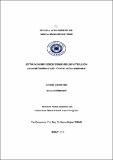Please use this identifier to cite or link to this item:
http://hdl.handle.net/11547/1815Full metadata record
| DC Field | Value | Language |
|---|---|---|
| dc.contributor.author | Değirmenci, Sinan | - |
| dc.date.accessioned | 2019-05-10T08:59:31Z | - |
| dc.date.available | 2019-05-10T08:59:31Z | - |
| dc.date.issued | 2015 | - |
| dc.identifier.uri | http://hdl.handle.net/11547/1815 | - |
| dc.description.abstract | Uzun yıllardır ülkemizde mesleki eğitim ve mesleki yeterliliği hayata geçirmek büyük bir sorun olmuştur. Bu olgudan yola çıkan bu çalışma mesleki eğitim ve mesleki yeterlilik konusu ile ilgili uygulamaları ve genç nüfus oranının Avrupa ülkeleri arasında ilk sırada yer almasına rağmen işsizlik oranının artarak devam etmesini dikkate alan bir araştırmadır. Araştırmaya göre; Ülkemizde sanayi sektöründeki kalifiye eleman eksikliği oranı % 40 olarak tespit edilmiştir. Türkiye’de kalifiye eleman eksikliği konusunda sanayi sektörü ilk sırada yer almaktadır. Bu çalışmada, sanayi sektörünün kalifiye eleman bulamamasının sebebi; iş gücünün mesleki bilgi ve becerisiyle iş piyasası arasındaki beklentinin farklı olmasından kaynaklandığı savunulmaktadır. Bu çalışmada ‘’ Mesleki Eğitimin Ülke Ekonomisine Katkısı, Avrupa’daki Mesleki Yeterlilik Sistemleri, Türkiye’de Mesleki Yeterlilik Sisteminin sorunları ve önemi ‘’ araştırılmaktadır. Dört bölümden oluşan çalışmanın; birinci bölümünde Eğitim kavramı, Türkiye’deki eğitim sistemi, Eğitimin Ekonomik fonksiyonları ve Türkiye’de Mesleki Eğitimdeki sorunlar üzerine değinilmiştir. İkinci bölümde ise mesleki eğitimde yapılan çalışmalar, Mesleki Yeterlilik Kurumu ve Avrupa örnekleri üzerinde durulmuştur. Üçüncü bölümde Türkiye’deki Mesleki Yeterlilik Sistemi, Kalkınma Planlarında Mesleki Eğitim, TUİK’e ait işgücü verilerinin analizi ve Mesleki Yeterlilik Kurumu’nun SWOT analizi yapılmıştır. Dördüncü bölümde ise bu bulguların analizleri değerlendirilerek Türkiye’deki mesleki yeterlilik sisteminin eksiklikleri ve problemleri ortaya çıkartılmıştır. | tr_TR |
| dc.language.iso | tr | tr_TR |
| dc.publisher | İSTANBUL AYDIN ÜNİVERSİTESİ SOSYAL BİLİMLERİ ENSTİTÜSÜ | tr_TR |
| dc.subject | Genç | tr_TR |
| dc.subject | Nüfus | tr_TR |
| dc.subject | Kalifiye Eleman | tr_TR |
| dc.subject | Mesleki Yeterlilik | tr_TR |
| dc.subject | Mesleki Eğitim | tr_TR |
| dc.subject | Sanayi Sektörü | tr_TR |
| dc.subject | Young Population | tr_TR |
| dc.subject | Qualified Personnel | tr_TR |
| dc.subject | Vocational Qualification | tr_TR |
| dc.subject | Vocational Training | tr_TR |
| dc.subject | Industrial Sector | tr_TR |
| dc.title | EĞİTİM EKONOMİSİ ÇERÇEVESİNDE MESLEKİ YETERLİLİGİN EKONOMİ ÜZERİNE ETKİSİ: TÜRKİYE DEĞERLENDİRMESİ | tr_TR |
| dc.type | Thesis | tr_TR |
| dc.description.abstractol | For many years, vocational training and implementations of vocational qualifications have been a big problem in our country. Based upon this phenomenon, this study is a research in deference to the applications of vocational training and professional competence, increasing rate of unemployment, although the youth bulge among Europian countries. According to the survey; rate of non-qualified personnel has been determined as forty percent in the industrial sector, in our country. Industrial sector takes place on the top about lack of the qualified personnel in Turkey. In this study, it is defended that the reason for the lack of qualified personnel in the industrial sector is different expectations between the craft knowledge and professional ability of the labour force and market. In this study, “The Contribution of Vocational Education to the national economy, Vocational Qualification System in Europe, the problems and importance of Vocational Qualifications System in Turkey” is investigated. The study consists of four parts; in the first part, the concept of education, education System in Turkey, the economical functions of education and problems in Vocational Education are mentioned. In the second part, the studies in Vocational Training, Vocational Qualifications Authority and European samples are mentioned. In the third part, Vocational Qualification System in Turkey, Vocational Training in the Development Plan, according to TSI (Turkey Statistical Institute), the analysis of the labour data and SWOT analysis of the Vocational Qualifications Authority is performed. In the fourth part, thereby analysis of these findings are evaluated, problems and deficiencies of Vocational Qualifications System in Turkey is revealed. | tr_TR |
| dc.publisher.firstpagenumber | 1 | tr_TR |
| dc.publisher.lastpagenumber | 126 | tr_TR |
| Appears in Collections: | Tezler -- Thesis | |
Files in This Item:
| File | Description | Size | Format | |
|---|---|---|---|---|
| 385706.pdf | Tez Dosyası | 2.63 MB | Adobe PDF |  View/Open |
Items in DSpace are protected by copyright, with all rights reserved, unless otherwise indicated.
